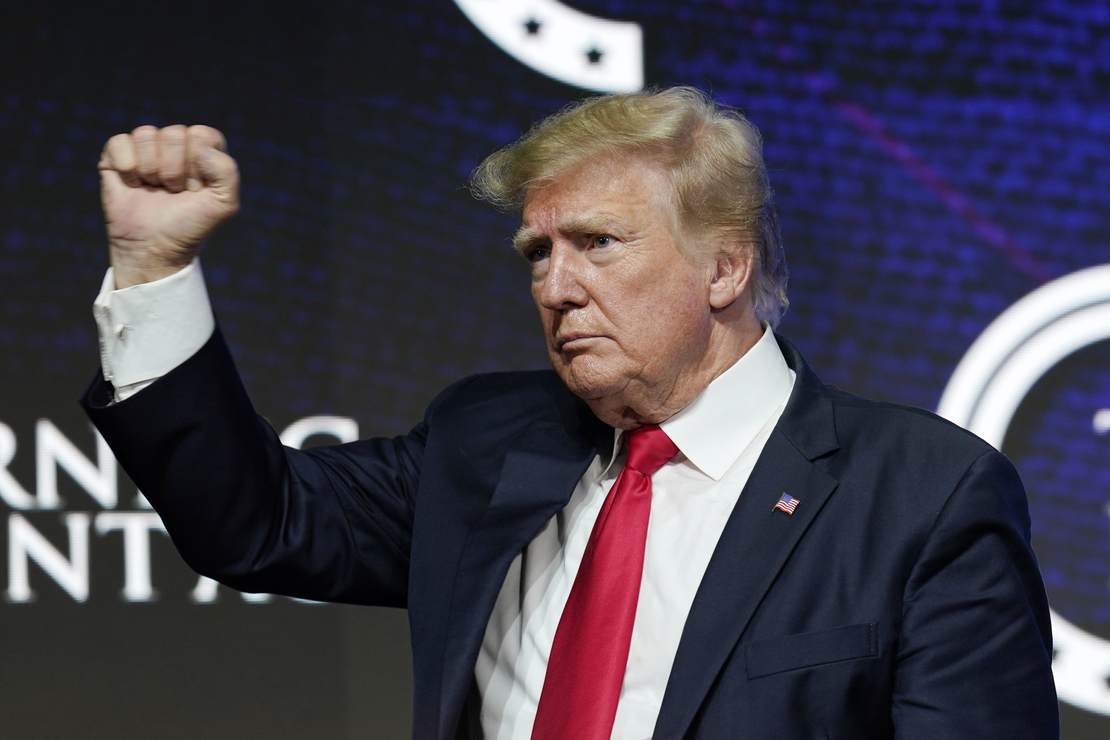
This raises one question above all others, which is … why did Donald Trump give an interview to the Washington Post? One would think that the Beltway’s main broadsheet would be considered by Trump to be the epitome of “fake news,” and yet Josh Dawsey got an exclusive for the Post that dropped this morning.
And that might actually be the biggest news out of the interview. The only other eyebrow-raising revelation by Trump is that he regrets not leading the march to the Capitol on January 6 and wishes he’d get more credit for the size of the crowd:
Former president Donald Trump voiced regret Wednesday over not marching to the U.S. Capitol the day his supporters stormed the building, and he defended his long silence during the attack by claiming House Speaker Nancy Pelosi and others were responsible for ending the deadly violence.
“I thought it was a shame, and I kept asking why isn’t she doing something about it? Why isn’t Nancy Pelosi doing something about it? And the mayor of D.C. also. The mayor of D.C. and Nancy Pelosi are in charge,” Trump said of the Jan. 6, 2021, riot in a 45-minute interview with The Washington Post. “I hated seeing it. I hated seeing it. And I said, ‘It’s got to be taken care of,’ and I assumed they were taking care of it.” …
In fact, Trump said he deserved more credit for drawing such a large crowd to the Ellipse — and that he pressed to march on the Capitol with his supporters but was stopped by his security detail. “Secret Service said I couldn’t go. I would have gone there in a minute,” he said.
The former president praised organizers of the rally, some of whom have now received subpoenas from federal authorities, and repeatedly bragged about the size of the crowd on the Ellipse, when questioned about the events of Jan. 6.
“The crowd was far bigger than I even thought. I believe it was the largest crowd I’ve ever spoken to. I don’t know what that means, but you see very few pictures. They don’t want to show pictures, the fake news doesn’t want to show pictures,” he said. “But this was a tremendous crowd.”
On the contrary — news outlets have repeatedly emphasized the size of the crowd, although not to give Trump or the organizers credit. They and the House’s committee on the riot have emphasized the dangers of the crowd based on its size as well as rhetoric from Trump and other speakers which they claim incited the crowd to riot. Trump sounds stuck on the complaint over the way media reported his inaugural crowd, so much so that he’s playing into the hands of his critics and accusers … at least to some small amount.
READ RELATED: Will Smith steps up with an actual apology to Chris Rock and to viewers
How much will that matter? Not a lot, I’d guess, since the real issue is incitement and not crowd size. The January 6 committee won’t be able to make a legal case for incitement, because in a Brandenburg legal context, Trump didn’t do anything to incur liability for what the crowd did without him. Had Trump actually led the crowd to the Capitol, that may have changed — but as it stands, all the committee can do is try to shame Trump and the organizers by laying out a moral case for incitement. And Trump himself is shameless, as this interview more or less proves all over again.
Otherwise, there’s not much in the way of stunning news from Dawsey’s sit-down, or at least nothing that Trump hasn’t already said or written in press releases from Mar-a-Lago. He still doesn’t think Ron DeSantis or Mike Pompeo will run against him in a Republican primary, affirming to Dawsey that Trump thinks DeSantis owes him:
“If I ran, I can’t imagine they’d want to run. Some out of loyalty would have had a hard time running. I think that most of those people, and almost every name you mentioned, is there because of me. In some cases, because I backed them and endorsed them. You know Ron was at 3 percent, and the day I endorsed him, he won the race,” he said. Asked if he thought he “made” DeSantis, Trump said he knew he did. “As soon as I endorsed him, the race was over,” Trump claimed.
Trump made the same claim about Victor Orbán’s win in Hungary too, claiming his endorsement caused the incumbent prime minister’s fortunes to rise “like a rocket.” Orbán called to thank him, Trump claimed, and also claimed to remain in close touch with other world leaders in what he hopes will turn out to be a hiatus in his presidency. “They want endorsements,” Trump told Dawsey, saying that he was “the king of endorsements.” Not discussed, however, was whether it was appropriate for former US presidents to be issuing explicit endorsements of candidates in foreign elections in the first place. It’s not, not at all, and even oblique quasi-endorsements from sitting or former presidents get criticized as interference in other nations’ democratic processes. And Americans certainly don’t appreciate it when other foreign leaders attempt quasi-endorsements in our elections.
All of this brings us back to the original question: why give an exclusive to the Washington Post, a paper he professed to hate on more than one occasion? For one thing, Trump needs to start thinking about kicking the campaign back into high gear at the end of the year, and those pumps will need some priming. Trump will certainly hope to get the same kind of media obsession around him that lifted his 2015 campaign into dominance and cleared the path to the White House. He will need the mainstream media outlets, not just conservative outlets, to make that strategy effective.
Or perhaps it’s more simple than that:
“I don’t want to comment on running, but I think a lot of people are going to be very happy by my decision,” he said, adding: “Because it’s a little boring now.”
Trump’s talking about the political climate here, at least ostensibly, but that lament could just as easily apply to Trump’s fifteen months out of the center ring.
Source:






